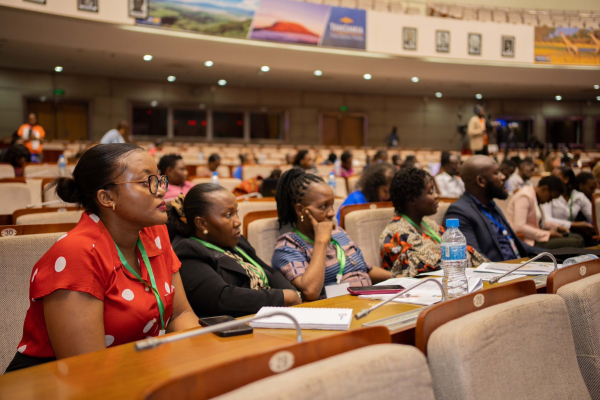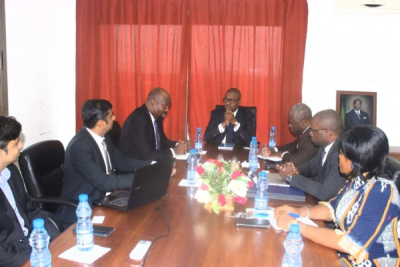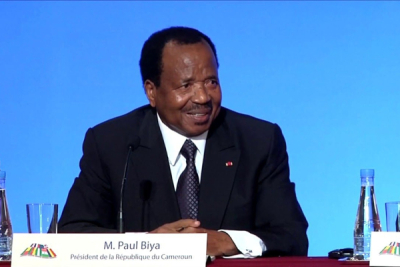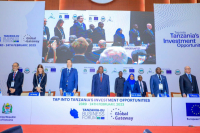
Public Management (603)
In recent years, the federal government of Nigeria has multiplied collaborations with local startups. The aim is to harness the youth’s tech expertise for national development.
The Federal Government of Nigeria has approved the use of the humanoid robot "Omeife" to enhance digital literacy in the country. A memorandum of understanding was signed to this effect on Saturday, March 11, between the National Information Technology Development Agency (NITDA) and Uniccon, the company that developed Omeife, the first humanoid robot in Africa.
According to Yau Isa Garba, national director of the NITDA’s National Centre for Artificial Intelligence and Robotics, the “whole idea of the project is [...] to leverage Omeife to deepen digital literacy in Nigeria.”
“The plan is that we are going to use the robot- just like the way people use ChatGTP- for guidance, instructions, and so on,” he added.
Omeife was presented by Nigeria's vice president, Yemi Osinbajo, at the global innovation tradeshow Gitex, Dubai, in October 2022. The 1.80-meter-long female robot was manufactured with local components. It can speak Pidgin, Yoruba, English, French, Arabic, Kiswahili, Hausa, Igbo, and Afrikaans and understands different African cultures. According to Chucks Ekwueme, Uniccon’s CEO, Omeife is “not just multilingual, it can switch languages and interact with specific gestures—hand illustrations, smile, and other bodily gestures—that match the tone of the conversation.”
According to Barrister Emmanuel Edet who was representing the Director General of NITDA, Nigeria plans to develop an application that will allow everyone to take advantage of Omeife.
Meanwhile, according to Chuks Ekwueme, in a context where Nigeria targets 95% digital literacy by 2030, Omeife can lead the country and Africa in general into a digital future.
Samira Njoya
Despite the Tanzanian government’s efforts, the country is still facing a huge digital gender gap. Nevertheless, the country is upping actions to remove barriers that prevent women and girls from accessing digital tools.
The Tanzanian government and the World Bank have reaffirmed their commitment to supporting women’s access to digital technologies.
On Tuesday, March 7, at a conference on women and technology held in Dar es Salaam ahead of International Women's Day, Nape Nnauye, the minister of information, communication, and technology, said the government and its partners are working to build a more inclusive and equitable future for women in technology in Tanzania.
The government has established a broad ICT program to involve women in the digital sector, we learn. According to Nape Nnauye, the Ministry of ICT plans to provide short and long-term training to 450 ICT professionals employed in the government, mainly women, starting in the 2023/2024 fiscal year.
Also, the government will soon unveil the National Digital Economy Strategy which is almost completed. The said strategy will lay out the country’s 10-year plan to develop its digital economy while closing the digital gender gap.
According to the Tanzanian ICT Commission, there are 1,011 registered male ICT professionals in the country against only 170 women. So, much remains to be done, according to Nathan Belete, the World Bank's country director for Malawi, Tanzania, Zambia, and Zimbabwe.
By funding Tanzania’s digital projects, the World Bank wants to raise the number of Tanzanian women engaged in the digital ecosystem.
Samira Njoya
Cabo Verde’s 2030 national development strategy places digital transformation at the heart of development in every socio-economic sector. In the finance sector, digital tools are expected to boost competition and improve financial inclusion.
Cabo Verde will soon adopt a bill governing the establishment and operations of digital banks. Indeed, the country submitted a draft bill that will be reviewed by the parliament during its parliamentary session scheduled for March 8-10, 2023.
According to the preamble of the government bill, digital banking institutions will have to comply with the requirements prescribed in the money laundering and terrorism financing prevention acts and other applicable regulations.
The government believes that digital banks can be highly beneficial to the country’s economy. They can for instance boost competition, expand the product offering with advanced and specialized products and improve access to financing for SMEs. In that regard, the draft bill wants to regulate the activities, make the funding processes more efficient, and keep the interest rates charged for loans to various clients in check.
In Cabo Verde, seven banks operate with a general commercial license, employing nearly 1,300 workers. They recorded historic profits of 42.5 million euros in 2022, up 26.5 percent from the previous year, according to Central bank provisional data reported by Portuguese news agency Lusa in late February.
Samira Njoya
Since November 2022 when he assumed office as Governor of Osun, Ademola Adeleke has initiated several projects aimed at anchoring his territory in the digital age. The latest move is the deployment of 64 kilometers of optic fiber.
The Governor of Osun State in Nigeria, Ademola Adeleke, announced on Monday, March 6 the deployment of a 64 km fiber optic cable in the state.
Speaking at a program held at the Adolak Events Center in Osogbo, the state capital, the governor said the NGN16 billion (about $35 million) project will accelerate digital transformation in various sectors and make the state’s digital economy one of the best in Nigeria.
“In line with the new National Broadband policy and the urgency of internet Fiber connectivity for Osun state, this government is waiving payment for Telecom Right of Way in return for free connectivity to our schools and health centers when the broadband project is completed,” the governor said.
In addition to the implementation of the fiber optic project, the Osun State governor disclosed several other projects ongoing in the state. Ademola Adeleke announced the inauguration of the first 15-member Digital Economy Advisory Board, whose mission is to support the state in its plan to transform Osun State’s economy.
The governor also informed the audience of a new partnership with ICT company Oodua Infraco, for the execution of the state's digital economy projects. The said partnership will identify and apply information and communication technologies in various sectors.
In the same vein, the Osun governor unveiled the recently launched Osun Google Mapping project, which aims to ensure businesses and landmarks are added to Google Maps. To date, the mapping coverage is over 50%, up 20% within four months, according to the governor.
Osun State plans to forward a Start-up Bill to the State House of Assembly for validation in the coming days. "This will be my first Executive Bill I will be forwarding to the State Assembly after this event. The Act is programmed to ensure that new start ups promoters and entrepreneurs secure desired mentoring and financing. The law once domesticated will enhance the goals of both the ICT and the Tech Innovation policy," governor Ademola Adeleke said.
To accelerate the implementation of its 2021-2023 digital transformation strategy, Gabon initiated several projects including the construction of a national data center. The offer made by the Indian businessmen includes the designing, construction, and maintenance of those infrastructures.
Last Thursday, Gabon’s Digital Minister Jean Pierre Doukaga Kassa welcomed a delegation of Indian businessmen from the Shapoorji Pallonji group who expressed their interest in the Gabonese digital sector.
On social media, the Ministry of Digital Economy said that the businessmen "offered their expertise in the design, construction, and maintenance of digital infrastructure, including data centers.”
The group also presented the projects it completed in Egypt, Ghana, and the Democratic Republic of Congo. They also exchanged with the Minister on the extension of the national backbone to three of Gabon’s provinces. The backbone projects discussed include a 623 km network between Lambaréné, Mayumba, and Doussala on the border with Congo-Brazzaville.
The Minister of Digital Economy then instructed his collaborators both in the central administration and the state companies under his supervision to analyze the Indian businessmen’s offers.
The construction of a national data center is one of the Gabonese government's flagship projects for the management and storage of its data. According to the news website Le Nouveau Gabon, the Indian businessmen’s visit comes after a meeting between the Gabonese Ministers for Investment Promotion and Digital Economy to discuss the construction of that national data center.
This officialization marks the beginning of a digital process announced in July 2022.
Last Thursday, Cameroonian President Paul Biya (photo) signed a decree updating the conditions of entry, stay and exit for foreigners in Cameroon.
According to the said decree, obtaining an electronic visa requires the prior submission of a visa application on a dedicated website that will soon be launched. The application can be made, regardless of the geographical area of the applicant, following established administrative and financial terms.
After the application, an online visa authorization will then be issued to the applicant who will then be able to go either to a diplomatic mission or to a border post to formalize the visa. This final phase will be completed with an enrolment process consisting of taking fingerprints and photographs. According to the decree, the visa is issued within three days after the online application.
The e-visa project is part of the Cameroon Digital Strategic Plan. In June 2022, the government received the computer equipment that was to serve in the project, which will be implemented by the Abidjan-based firm Impact Palmarès R&D SAS. The bill updating the legal framework for entry, exit, and stay in Cameroon was submitted to the National Assembly on July 2, 2022.
The implementation of the e-visa project will help centralize and protect data, control entries, and exits and monitor the revenues generated by the government from visa applicants, who will now pay the fees online.
In July 2022, Minister for Foreign Affairs Lejeune Mbella Mbella indicated that the e-visa will also save time and costs for users since it will address two of the grievances always pointed out by foreigners seeking Cameroonian visas. Namely, it will end both the long trips to embassies and the long queues involved.
Samira Njoya
In Tanzania, the ICT sector is growing rapidly. But, to quicken the pace of growth, authorities want to attract foreign entrepreneurs.
Tanzanian Vice President Philip Mpango recently invited investors from around the world to explore and invest in Tanzania's ICT and digital transformation sector.
On Thursday, February 23, while opening the first Tanzania-European Union (EU) Business Forum in Dar es Salaam, he praised his country’s digital sector while reminding investors that the country's national ICT policy supports investments in digital infrastructure such as data centers and digital technology institutes.
"ICT and digital transformation are among the key drivers of rapid development...This is aimed at improving skills and leveraging cutting-edge digital innovations such as robotic engineering and artificial intelligence," he said before adding that the Tanzanian government was focused on building a dynamic economy based on four pillars, namely reform, reconciliation, resilience, and reconstruction.
To pave the way for domestic and international investors, the government has taken steps to strengthen and modernize the sector, including the establishment of the Tanzania Investment Centre and the Zanzibar Investment Promotion Authority. The centers are intended as one-stop shops for investment promotion and facilitation.
Attracting investments is just one of the actions being implemented by the Tanzanian government to develop the ICT sector. In October, the government inaugurated a $3.4 million infrastructure package. The infrastructures covered include 11 ICT centers in the 11 districts of Unguja and Pemba, the two main islands forming the Zanzibar archipelago, as well as 42 communication towers across the archipelago.
Samira Njoya
A few months ago, Tunisia kicked off the digitalization of its public services. The aims were, among others, to end unnecessary bureaucracy and guarantee the quality and efficiency required for the services.
Tunisia’s mobile ID project will target over 100,000 citizens this year, ICT Minister Nizar Ben Néji indicated last Friday.
During a campaign aimed at raising awareness of the benefits of mobile ID, the official explained that his ministry was working to reach more than 100,000 Tunisians this year and increase the number to the thousands in the years to come.
"The Ministry is working with banks to introduce mobile IDs in the banking sector,” he said pointing at the upcoming introduction of electronic contracts in car sales and purchase procedures.
The country launched its Mobile ID service on August 3, 2022. The ID was introduced as a universal and unique authentication method to access some public services online. The aim is to gradually replace cumbersome administrative procedures with digitized, simple, and fairly secure procedures.
Earlier this year, the official website dedicated to digital identity in Tunisia announced that as of Monday, January 2, 2023, the number of applications for digital identity not activated had reached 86,000 while the number of digital identities activated was 36,474. For the Minister of ICT, this is a good start. However, the country wants to generalize the use of the mobile ID and introduce other online services, in cooperation with other ministries. Hence the awareness campaign.
Samira Njoya
In sub-Saharan Africa, the chronic absence of civil servants tends to undermine many institutions. To address this growing phenomenon, governments are turning to digital technologies to provide adequate solutions.
The Gambia recently called on ministries, departments, and agencies to install biometric tallying systems to confirm the presence of civil servants at work. According to a memo issued by The Gambia's Ministry of Public Service, Administrative Reforms, Policy Coordination, and Implementation, the call is merely a reiteration of an earlier memo issued by the Secretary-General and Head of the Public Service in February 2021.
The memo instructs the concerned institutions to acquire and install the biometric attendance system, per the specifications, by the end of February 2023.
Recently in Kenya, the Nairobi County government made a similar decision. It announced that it would introduce a digital employee registration system and biometric identity cards to identify "ghost" employees at the town hall.
Johnson Sakaja, the governor of Nairobi, said the county had budgeted Ksh10 million ($79,000) for the project, which will identify irregular workers among the approximately 13,000 civil servants working for the city council.
Meanwhile, in Gambia, the government plans to replace ID cards with an electronic biometric tallying system, with data to be printed weekly and transmitted monthly to the secretary general and head of the civil service.
The new reforms aim to combat the ills that plague the sector (including absenteeism), modernize the administration, and reduce the huge wage bill that ghost workers impose on the government.
Samira Njoya
The Egyptian government has made citizen-centric digital transformation a key factor in its development. To achieve its goals, it has increased investment in the ICT sector.
Egyptian President Abdel Fattah al-Sissi (photo, center) recently called on his government to provide all necessary support to build and develop the skills of Egypt's youth, support start-ups and encourage their expansion in the ICT sector.
Last Saturday, during his meeting with Prime Minister Mostafa Madbouli and Minister of Communications and Information Technology Amr Talaat, the Egyptian president issued "directives to continue the state's efforts in digital transformation and the automation of administrative and governmental procedures." According to the presidency, the directives aim to "assist citizens and reduce time, effort and costs [...] while keeping up with the state-of-the-art technological applications in the field of artificial intelligence, whose importance and added value steadily increase globally."
In recent years, thanks to its digital strategy "Digital Egypt", the country has made significant progress in the digital sector. It has implemented several initiatives and projects, including "Egypt Digital Cubs", and digital innovation centers, as well as the development of Egyptian post offices, real estate registration offices, technology parks, and applied technology schools.
In July 2022, the government announced the allocation of a budget of EGP 6.025 trillion ($319.1 million) for digital and cybersecurity projects in the fiscal year 2022-2023. Specifically, EGP 5.4 trillion will be allocated to digital transformation projects and the development of digital skills.
The initiatives and efforts directed by the President of the Republic are in line with Vision 2030, the country's development strategy, which aims to strengthen economic and social development in all sectors and make the country a digital pole of excellence in Africa.
Samira Njoya
More...
Thanks to the assistance, Kenya expects to complete its ongoing digital projects within ten years.
Last Thursday, the Kenyan Minister of Digital Economy Eliud Owalo (photo) indicated the country requested the World Bank's financial assistance for the partial implementation of its 100,000-km fiber deployment project.
“With Cabinet approval already in place, we are now set to roll out an initial 5,000 kilometers by June 2023. We are also in talks with the World Bank, through the National Treasury, to secure part of the funding for the digital superhighway, through the Kenya Digital Economy Acceleration Project (KDEAP),” the government official said speaking at the third edition of the digital summit organized by the Nation Media Group in Mombasa. The fiber optic project is part of the 2022-2023 National Digital Master Plan launched in April 2022.
During the digital summit, Eliud Owalo also announced other equally important digital projects, including the implementation of a national identity system by June, the integration of 5,000 government services on the e-citizen portal, and the digitization of the land registry which could potentially unlock 100 million shillings in revenue (about $790,000) from the land sector.
Samira Njoya
By setting up a series of digital projects, Angolan authorities want to meet citizens' need for electronic services, namely to facilitate access to some public services.
Angola will invest $89 million to build the national cloud infrastructure, train technicians, and store and unify government services, Communications Minister Mário de Oliveira (photo) announced last Thursday during the official launch of the cloud project.
"It's a unified government cloud built on government data centers to provide more than 80 services," said Mário de Oliveira, adding that the project includes the migration of existing applications and the development of new ones.
According to André Pedro, director of the National Institute for the Promotion of the Information Society (INFOSI), the project includes the construction of two data centers that will cover 5,320 square meters and house 204 server racks, thus reducing electronic communication costs for the government.
The technology project will also complement the Angolan State's dedicated network, which connects all ministries and the National Assembly with a 50 GB fiber ring. It is scheduled to be implemented within 15 months and completed between February and March 2024.
It is the result of a Memorandum of Understanding signed in December 2021 between the Angolan government and the United Arab Emirates. It will be implemented by INFOSI with the support of the Ministry of Communications, we learn.
According to Mário de Oliveira, the project aims to promote the digital development of the national economy, bring citizens closer to government action, promote the use of IT and cloud services, and lay the foundations for the digital transformation of the industrial sector.
Samira Njoya
Rwanda is among the African nations with a commendable level of digital readiness. All sectors are being transformed in the country, including education.
Rwanda wants to connect additional 3,000 schools to the internet by 2024, ICT Minister Paula Ingabire recently indicated during a Plenary Sitting of the Chambers of Deputies.
Responding to questions on the project, she responded "Currently, there are 6,756 schools, including elementary schools, secondary schools, and technical and vocational education and training (TVET) in the country. Of these schools, about 3,000, or 44.4% of the total, are not connected to the Internet."
"We have Smart Education Project, through the US$30 million financing we got from China Exim Bank, under which we will connect at least 1,500 schools," she added.
In addition to China Exim Bank, which is supporting the Rwandan government's digital transformation project, the World Bank approved US$100 million to finance the project in 2021. The aim was to boost access to broadband internet, increase digital use and enhance the digital innovation ecosystem.
According to Minister Ingabire, most of the financial resources were allocated to infrastructure for last-mile connectivity, including Internet access for schools. "By using the funds from the China Exim Bank, and those from the World Bank, it was observed that about 3,000 schools that are not connected to the internet will have access to it by 2024," she said.
For Emmanuel Mfitumukiza, president of the Rwandan chapter of the Internet Society, Internet connectivity in primary and secondary schools will help implement a skills-based curriculum and increase digital literacy in even the most remote schools in the country.
Samira Njoya
Broadband Internet service provider Starlink is currently pursuing its strategy to capture some 20 African markets. So far, the company has launched operations in Nigeria and is looking to do the same in Kenya and Tanzania.
The Tanzanian government has blocked the process that would allow Elon Musk (photo) and his company Starlink to provide Internet services in the country. On Wednesday, February 8, Tanzania Communication Regulatory Authority (TCRA)'s Director General Jabiri Bakari told the press that Starlink will have to complete essential documentation before the procedure can go ahead.
"You know, Starlink’s satellite internet involves much more issues than the way it is portrayed on social media platforms. It involves different particulars that need different requirements from the regulator in line with the type of license being applied for," Jabiri said.
On October 6, 2022, Starlink applied to provide its satellite internet services in Tanzania. After a meeting on January 27, 2023, some issues were still not resolved. The internet service provider blames the government for not communicating the documents required for the application. On Twitter, Elon Musk indicates that Starlink is ready and just waiting.
Starlink is slated to launch in Tanzania between January and April 2023, if the application is approved. The service will be available in Dar es Salaam, Arusha, Tanga, Tabora, and Mwanza. This will greatly boost the digital sector with the broadband internet connection provided.
Samira Njoya















